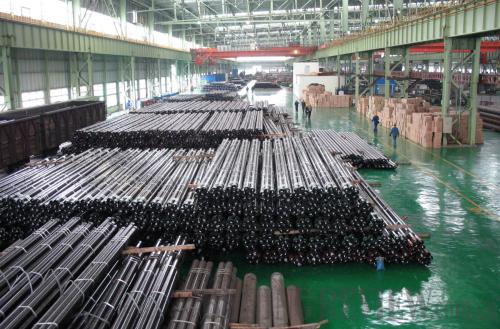|
 |
|
GLOBAL SUPPLIER: Oil and natural gas pipelines and other high value-added products from Hengyang Valin Steel Tube Co. Ltd. are sold in more than 40 countries and regions. The company is the biggest producer of small-diameter seamless pipes in the world (SU XIAOZHOU) |
Such volatile behaviors have called forth not only complaints from the business circle, but also some official opposition from the United States. On September 18, 2009, the United States Court of International Trade issued a ruling that said it is unreasonable for the U.S. Department of Commerce to, regarding China as a non-market economy, impose both anti-dumping and countervailing duties based on a surrogate country system.
On April 27, 2010, the U.S. Department of Commerce submitted to the United States Court of International Trade the final results of its redetermination on the case of off-road tires, refusing to either stop applying countervailing duty laws to China or treat it as a market economy for the purposes of anti-dumping law. On August 4, 2010, the United States Court of International Trade handed down a judgment, saying it is illegal to impose countervailing duties upon non-market economy countries and directing the Department of Commerce to cease simultaneous application of anti-dumping and countervailing duties against the same imports from China.
However, the U.S. Department of Commerce didn't change its discriminative behaviors against China, launching anti-dumping and countervailing investigations upon Chinese products, like seamless tubes and coated paper.
Li says during the past five years, China tried to address the problem with the U.S. Government several times. However, the U.S. Department of Commerce refused to correct its unfair double remedies regardless of the opposition from Chinese enterprises and U.S. importers as well as U.S. court judgments, all of which put a heavy burden on China's export enterprises. In addition to this case, the United States has initiated more than 20 others involving anti-dumping and countervailing.
According to MOFCOM estimates, in 2015 China-U.S. bilateral trade will be valued at $500 billion, $200 billion of which will be exports by the United States to China. Statistics from the General Administration of Customs of China show that in 2010 China-U.S. bilateral trade stood at $102.3 billion, which means within five years China-U.S. trade volume will grow by nearly one third, and China's imports from the United States will double.
In contrast to such optimistic prospects, the United States revised its trade facilitation policy on December 9, 2010, extending preferential trade policies to 164 countries in three categories—China is excluded from the 164 countries.
Liu Xu, Director of the International Trade Office of the Institute of Foreign Economy affiliated to the National Development and Reform Commission, says as long as China's market economy status is not recognized by the United States, the latter can draw conclusions about dumping and then impose anti-dumping duties with the authorization of the WTO. Moreover, for the sluggish economy and high unemployment rate in the United States in recent years, U.S. interest groups competing against Chinese products are targeting "made-in-China" items. If this background is not fundamentally changed, trade frictions between China and the United States and their battle on the platform of the WTO will continue.
Lessons learned?
As the first and second largest economies in the world, the United States and China are mutually dependent during the process of economic globalization. The United States should confirm China's status as a market economy as soon as possible and relax various non-economic restrictions on the products exported by China.
China entered the WTO in 2001, and WTO rules and China's accession protocol are the obligatory rules that the Chinese Government must obey. Since the rules were formulated by Western countries, China has been in a weak position, facing frequent accusations by the West.
At present, China-U.S. trade has come to the global forefront. With more Chinese industries engaging in global trade, the trade frictions between China and the United States have extended from sectors such as furniture and textiles to iron and steel, color TV, chemical raw materials, farm produce and intellectual property rights, transferring from primary products to manufactured goods and hi-tech products.
Therefore, to avoid trade frictions, China must, besides better understanding international rules, make changes to its rules and practices that are inconsistent with international rules and make sure its voice is heard as new international rules and regulations are formulated in the future. | 